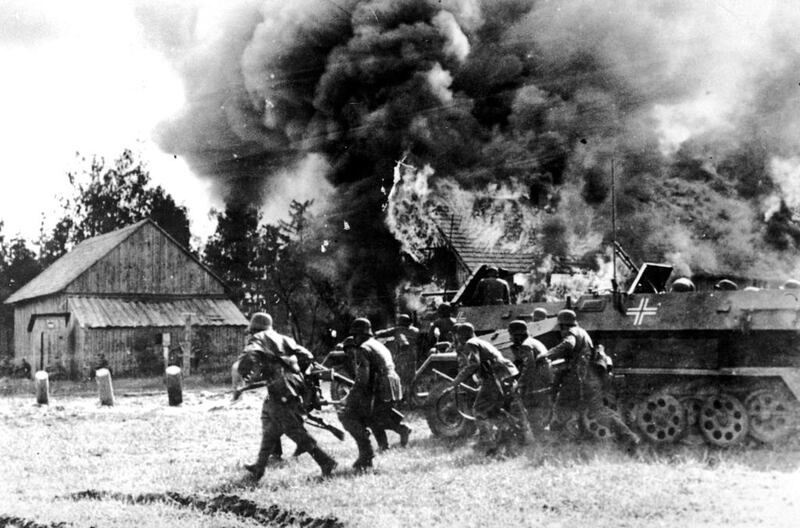It might seem perverse and counter-intuitive to praise China for clamping down on freedom of expression. Normally, one might prefer to urge a greater plurality of views in the People’s Republic. But the state media watchdog has just issued a ruling that ought to be cheered to the rafters: satellite TV stations are going to be restricted to one reality series a year. For just when it seemed that this genre couldn’t scrape the sewer any further, a new show is pushing the boundaries of taste so far that one has to be glad that at least one country is taking a stand against this scourge of the airwaves.
The new series, which has begun on Czech television, makes “entertainment” about life under Nazi occupation. In Holiday in the Protectorate (which refers to the parts of the then state of Czechoslovakia that became the Nazi Protectorate of Bohemia and Moravia), three generations of a family attempt to deal with the privations of living on a remote farm in 1939, complete with actors playing jackbooted Gestapo officers. A cash prize is theirs if they get to the end of the eight episodes. Those behind the programme have attempted to defend it as being “educational” and claim, somewhat ludicrously, to be taken aback by the levels of criticism they have received. Although given the subject matter, comments such as “What’s next – Big Brother Auschwitz?”, can hardly have been a surprise.
It is easy enough to list the horrors and excesses of reality television: from Fox’s Temptation Island, in which the “amusement” derives from seeing if either member of a faithful couple stray, to NBC’s Fear Factor, the premiere of which involved contestants having 400 live rats showered down on them. It would also be fair to point out that some reality shows are pretty harmless, while there are a few that actively do good. Million’s Poet and Prince of Poets on Abu Dhabi TV, for instance, have brought poetry to audiences of up to 70 million in the Middle East, while The Choir on the BBC has encouraged people to take part in the joyous act of choral singing. But such altruism informs few instances of a genre so debased that one might now prefer it to be banned altogether.
Some might argue that these shows are harmless fun. Others were initially touted as having some spurious higher purpose. When Big Brother started in the UK, for instance, it was widely talked of as being a “social experiment”. But the truth is that many of these shows are highly exploitative, and damaging not only to the participants but to the values of societies where they become the norm.
Even during Big Brother’s first series a complaint was made to the British Psychological Society about the stresses and long-term effects on those taking part. In 2006, a contestant walked out five days into the series after threatening to kill himself. Television executives claim to have the concern for the welfare of those involved; but it is clear that such programmes are going to attract attention-seekers, the vulnerable and the deluded.
They, and those who watch, are encouraged to believe that it is somehow worthy and laudable to aspire to become famous, simply by appearing on TV. The ease and speed with which reality television makes “stars” is, however, a cruel deceit.
Firstly, despite the proliferation of programmes, the numbers of those who can take part is still very low. Secondly, this fame tends to be so fleeting and insubstantial that it provides nothing more than a temporary fillip, the disappearance of which will end in disappointment.
But more importantly, a society in which being recognised for having done essentially nothing is elevated above a life of unsung achievement, or one of day to day conscientious and dutiful work, is one that rests on very shaky moral bearings. Would any of us want our children looking up to Jack Osbourne or Kim Kardashian, let alone any of the thousands of already faded reality stars, as role models?
Further, the ubiquity of these series only fuels a narcissism that has been encouraged by the instant mass communication available through social media and the internet. Self-esteem has given way to the unchallenged self-validation of emotions, or what the American psychologist Jean Twenge, the author of Generation Me, refers to in the title of another of her books as The Narcissism Epidemic: Living in the Age of Entitlement.
There is no time for reflection and consideration in a time that prizes spontaneous expression as the ultimate in authenticity. Pity poor Socrates. The philosopher’s declaration that “the unexamined life is not worth living” stands little chance of catching on today. Not only are attention spans too short, but the culture militates against even making the effort.
If all this seems a lot to load on to a genre of television programme, consider this. When Big Brother first appeared, was it even conceivable that the man most responsible for that low class bilge – Peter Bazalgette – would one day end up as head of the Arts Council England? And would even the outlandish comedian Mel Brooks ever have dared imagine that a game show about life under the Nazis would end up being broadcast?
Reality television is neither harmless nor fun, but encourages a self-obsessed society of lotus-eaters incapable of judgment. Perhaps it is no surprise that “the market”, which will always seek the lowest common denominator, fails to recognise what a communist autocracy still can.
Sholto Byrnes is a Senior Fellow at the Institute of Strategic and International Studies, Malaysia





